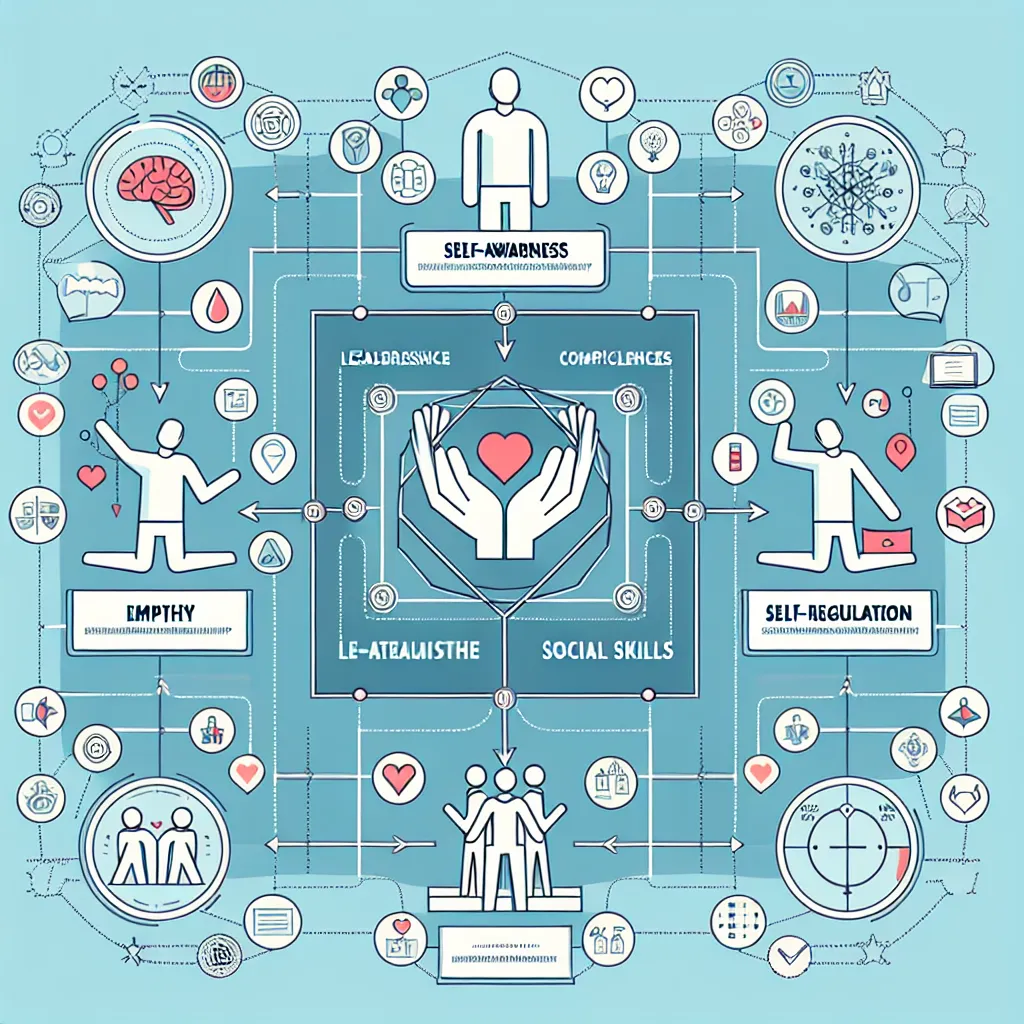The IELTS Reading section is a crucial component of the test, assessing your ability to comprehend complex texts and respond to various question types. Today, we’ll focus on a topic that has gained significant traction in recent years: “The importance of emotional intelligence in leadership.” This subject has appeared in several IELTS exams over the past decade, reflecting its relevance in today’s business world. Given its continued importance in organizational psychology and management studies, it’s highly likely that you may encounter a similar passage in your upcoming IELTS test.
Let’s dive into a practice reading passage and questions to help you prepare for this potential topic.
Reading Passage
The Critical Role of Emotional Intelligence in Effective Leadership
In the ever-evolving landscape of modern business, the concept of leadership has undergone a significant transformation. While traditional metrics of success such as intelligence quotient (IQ) and technical expertise remain important, a new factor has emerged as a key differentiator among leaders: emotional intelligence (EI). First popularized by psychologists John Mayer and Peter Salovey, and later brought to the forefront by Daniel Goleman, emotional intelligence refers to the ability to recognize, understand, and manage one’s own emotions, as well as the emotions of others.
The importance of emotional intelligence in leadership cannot be overstated. Leaders with high EI are better equipped to navigate the complex interpersonal dynamics of the workplace, fostering a positive organizational culture and driving team performance. These emotionally intelligent leaders demonstrate several key characteristics that set them apart from their peers.
Firstly, self-awareness forms the foundation of emotional intelligence. Leaders who possess a deep understanding of their own emotional states, strengths, weaknesses, and driving factors are better positioned to manage their behaviors and impact on others. This self-knowledge allows them to approach challenges with a level head and make decisions that align with their values and the organization’s goals.
Secondly, empathy plays a crucial role in emotionally intelligent leadership. The ability to put oneself in another’s shoes and understand their perspective is invaluable in building strong relationships and resolving conflicts. Empathetic leaders are more attuned to the needs and concerns of their team members, fostering an environment of trust and open communication.
Furthermore, emotionally intelligent leaders excel in self-regulation. They can control impulsive behaviors, adapt to changing circumstances, and maintain composure under pressure. This emotional stability inspires confidence in their team and helps create a calm, productive work environment even in the face of challenges.
Another key aspect of emotional intelligence in leadership is social skill. Leaders with high EI are adept at building and maintaining relationships, collaborating effectively, and influencing others. They can navigate complex social situations with ease, fostering teamwork and driving collective success.
Research has consistently shown that leaders with high emotional intelligence are more effective in their roles. A study by the Center for Creative Leadership found that the primary causes of executive derailment involve deficits in emotional competence, including difficulty in handling change, inability to work well in a team, and poor interpersonal relations. Conversely, leaders who score high on emotional intelligence measures are more likely to be rated as effective leaders by their subordinates and superiors.
The impact of emotional intelligence extends beyond individual leadership effectiveness to organizational performance. Companies that prioritize emotional intelligence in their leadership development programs often see improvements in employee engagement, retention, and overall productivity. A study by Hay Group found that organizations with emotionally intelligent leadership were 20% more likely to outperform their competitors.
As the business world continues to evolve, with increasing emphasis on collaboration, diversity, and adaptability, the importance of emotional intelligence in leadership is likely to grow. Future leaders will need to navigate complex global relationships, manage remote teams, and guide their organizations through rapid technological and social changes. In this context, the ability to understand and manage emotions – both one’s own and others’ – will be a critical skill for effective leadership.
In conclusion, while technical skills and cognitive abilities remain important, emotional intelligence has emerged as a crucial factor in leadership success. As organizations recognize the value of EI, we can expect to see a continued focus on developing these skills in current and future leaders. Those who can master the components of emotional intelligence – self-awareness, empathy, self-regulation, and social skill – will be well-positioned to lead effectively in the complex, dynamic business environment of the future.
 Emotional Intelligence in Leadership
Emotional Intelligence in Leadership
Questions
Section 1: True/False/Not Given
Determine if the following statements are True, False, or Not Given based on the information in the passage.
- Emotional intelligence is more important than IQ in determining leadership success.
- Self-awareness is considered the foundation of emotional intelligence.
- Empathetic leaders are better at resolving conflicts in the workplace.
- Leaders with high emotional intelligence always make the best decisions for their organizations.
- The concept of emotional intelligence was first introduced by Daniel Goleman.
Section 2: Multiple Choice
Choose the best answer according to the information given in the passage.
-
According to the passage, which of the following is NOT a key characteristic of emotionally intelligent leaders?
A) Self-awareness
B) Empathy
C) Technical expertise
D) Self-regulation -
The study by the Center for Creative Leadership found that:
A) Emotional intelligence is irrelevant to executive success
B) Technical skills are the primary cause of executive derailment
C) Deficits in emotional competence can lead to executive failure
D) High IQ is the most important factor in leadership effectiveness -
Organizations with emotionally intelligent leadership are:
A) 10% more likely to outperform competitors
B) 15% more likely to outperform competitors
C) 20% more likely to outperform competitors
D) 25% more likely to outperform competitors
Section 3: Matching Headings
Match the following headings to the appropriate paragraphs in the passage. There are more headings than paragraphs, so you will not use all of them.
A) The future of emotional intelligence in leadership
B) Defining emotional intelligence
C) The impact of EI on organizational performance
D) Self-regulation in leadership
E) The origins of emotional intelligence theory
F) Empathy as a leadership skill
G) Research supporting the importance of EI in leadership
H) Social skills in emotionally intelligent leadership
- Paragraph 2: ____
- Paragraph 5: ____
- Paragraph 7: ____
- Paragraph 8: ____
Section 4: Summary Completion
Complete the summary below using words from the box. You may use each word only once.
empathy technical self-awareness cognitive social
impulsive adaptability collaboration global productivity
Emotional intelligence in leadership encompasses several key components, including (13)__, which allows leaders to understand their own emotions and behaviors. Another important aspect is (14)__, which enables leaders to understand and relate to others’ perspectives. Emotionally intelligent leaders also demonstrate strong (15)__ skills, allowing them to build relationships and influence others effectively. Research has shown that organizations prioritizing emotional intelligence often see improvements in employee engagement and overall (16)__. As the business world becomes increasingly complex and (17)__, the importance of emotional intelligence in leadership is expected to grow even further.
Answer Key and Explanations
-
Not Given – The passage doesn’t explicitly state that EI is more important than IQ, only that it’s a key differentiator.
-
True – The passage states, “self-awareness forms the foundation of emotional intelligence.”
-
True – The text mentions that empathetic leaders are better at “resolving conflicts.”
-
Not Given – While the passage emphasizes the benefits of high EI, it doesn’t claim that these leaders always make the best decisions.
-
False – The passage states that EI was “First popularized by psychologists John Mayer and Peter Salovey, and later brought to the forefront by Daniel Goleman.”
-
C – Technical expertise is not mentioned as a key characteristic of emotional intelligence in the passage.
-
C – The passage states that the study found “the primary causes of executive derailment involve deficits in emotional competence.”
-
C – The text mentions that “organizations with emotionally intelligent leadership were 20% more likely to outperform their competitors.”
-
B – This paragraph introduces and defines emotional intelligence.
-
D – This paragraph focuses on self-regulation as an aspect of emotional intelligence.
-
G – This paragraph discusses research findings supporting the importance of EI in leadership.
-
C – This paragraph talks about the impact of EI on organizational performance.
-
self-awareness
-
empathy
-
social
-
productivity
-
global
Common Mistakes to Avoid
- Confusing “Not Given” with “False”: Remember, “Not Given” means the information isn’t present in the text, while “False” means the text contradicts the statement.
- Overlooking key phrases: Pay attention to phrases like “according to the passage” in questions, which require you to base your answer solely on the given text.
- Getting distracted by familiar topics: Even if you know about emotional intelligence, focus on what the passage says, not your own knowledge.
- Rushing through the text: Take time to understand the main ideas and structure of the passage before attempting the questions.
Vocabulary
- Evolving (verb): Developing gradually
- Differentiat or (noun): A distinguishing feature or quality
- Interperson al (adjective): Relating to relationships or communication between people
- Derailment (noun): A failure or breakdown in a plan or endeavor
- Impulsive (adjective): Acting or done without forethought
- Competence (noun): The ability to do something successfully or efficiently
Grammar Focus
Pay attention to the use of comparative structures in the passage, such as:
“Leaders with high EI are better equipped to navigate the complex interpersonal dynamics of the workplace”
This structure “comparative adjective + than” or “more + adjective + than” is commonly used to compare two things or ideas.
Tips for IELTS Reading Success
- Practice active reading: Engage with the text by predicting content, identifying main ideas, and summarizing key points.
- Improve your vocabulary: Regularly learn new words and phrases related to common IELTS topics like business, education, and technology.
- Time management: Allocate your time wisely between reading the passage and answering questions. Don’t spend too much time on difficult questions.
- Skim and scan effectively: Use these techniques to quickly locate specific information in the text.
- Read the instructions carefully: Make sure you understand what each question is asking before attempting to answer.
Remember, success in IELTS Reading comes with consistent practice and familiarity with various question types. Keep practicing with diverse topics and question formats to improve your skills and confidence. Good luck with your IELTS preparation!
For more IELTS practice materials and tips, check out our other resources on how to describe leadership roles in IELTS Speaking and the importance of soft skills in the workplace.


